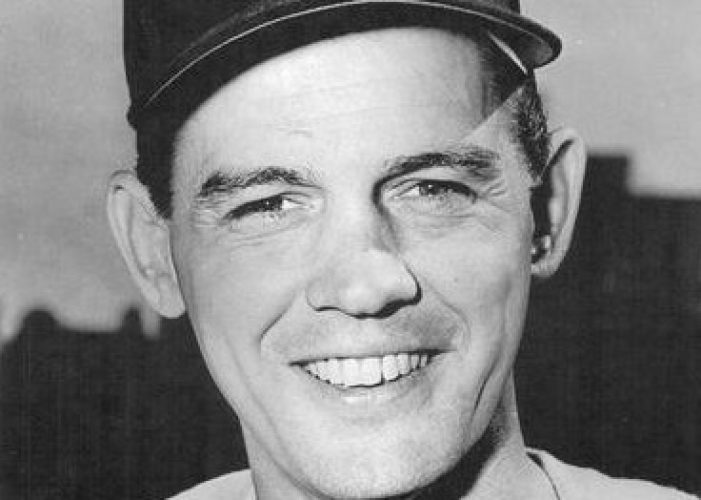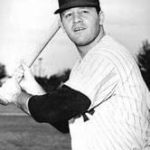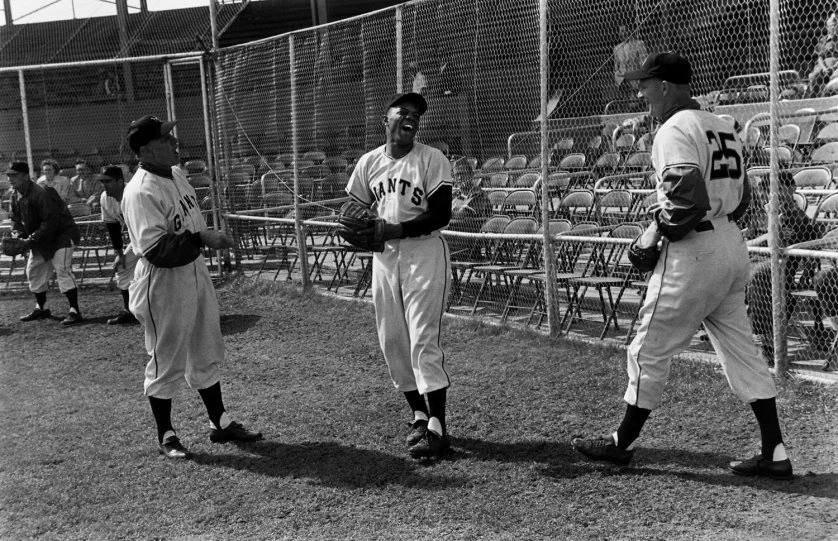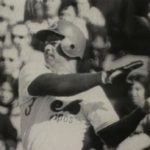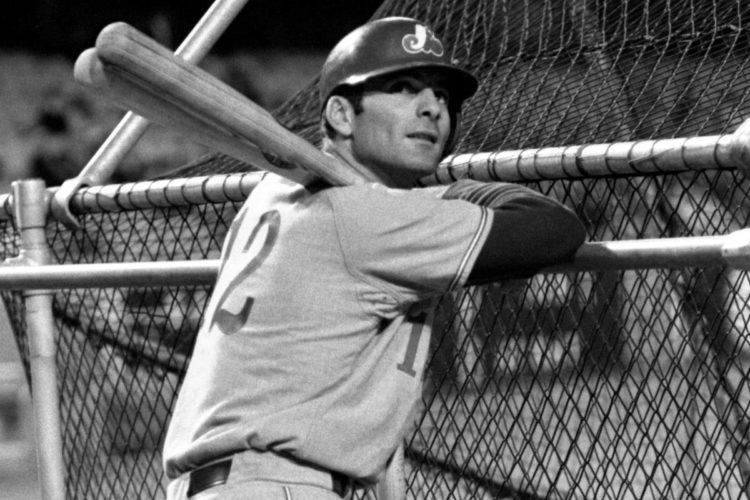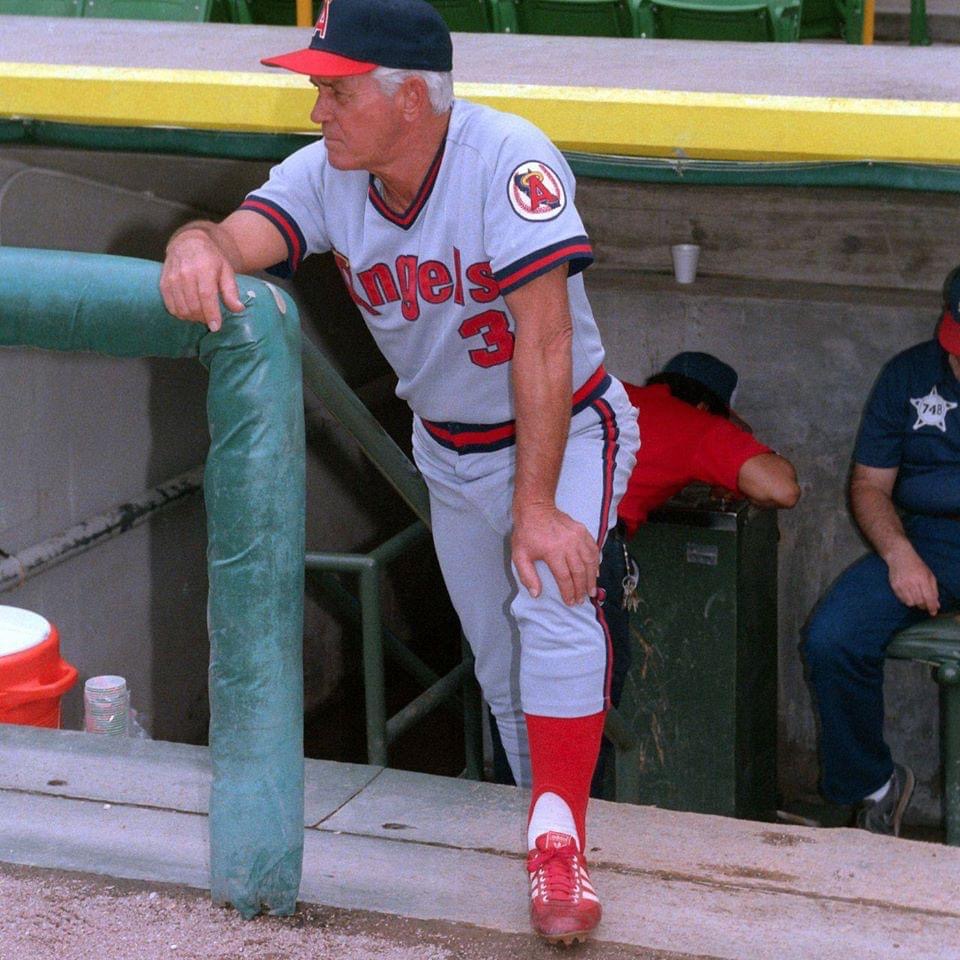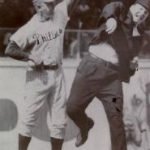Gene Mauch
Positions: Second Baseman, Shortstop and Third Baseman
Bats: Right • Throws: Right
5-10, 165lb (178cm, 74kg)
Born: November 18, 1925 in Salina, KS
Died: August 8, 2005 in Rancho Mirage, CA
Buried: Cremated
High School: Fremont HS (Los Angeles, CA)
Debut: April 18, 1944 (9,649th in major league history)
vs. PHI 2 AB, 0 H, 0 HR, 0 RBI, 0 SB
Last Game: September 28, 1957
vs. NYY 1 AB, 1 H, 0 HR, 0 RBI, 0 SB
Full Name: Gene William Mauch
Nicknames: Skip
Pronunciation: \MOCK\
View Player Info from the B-R Bullpen
View Player Bio from the SABR BioProject
Relatives: Brother-In-Law of Roy Smalley; Uncle of Roy Smalley
Nine Other Players Who Debuted in 1944
Eddie Yost
Eddie Lopat
Joe Nuxhall
Granny Hamner
Gene Mauch
Emil Verban
Jim Konstanty
Cal McLish
Ralph Branca
All-Time Teammate Team
Coming Soon
Notable Events and Chronology
Biography
When he retired in spring training of 1988, Gene Mauch had managed more games and for more years (26) than anyone in major league history but Connie Mack, John McGraw, and Bucky Harris. He also managed the longest without winning a pennant; he came close three times. Leading by 6-1/2 games with two weeks to go, his 1964 Phillies collapsed, finishing in a tie for second. Many said he overworked his three best pitchers at the end of the race. His Angels won two divisions titles, but suffered heartbreaking losses in the ALCS. They needed to win one of the final three games in 1982 against Milwaukee, but failed to do so. In 1986, California was one strike away when Boston’s Dave Henderson homered to win Game Five; the Red Sox then easily took the final two contests. When asked by brave reporters how he could deal with those memories, Mauch replied, “I have an amazing ability to forget.”
Mauch’s playing career began in 1943 in the Dodger organization. He relied more on brains than on brawn. He had had trials with five NL teams in 1953 when he became the 28-year-old playing manager of the Southern Association’s Atlanta Crackers. “I really wasn’t ready,” he later admitted. He had a low boiling point, often fought with umpires, and expected too much of his players. With an eye on again playing in the majors, he gave up managing. He batted .348 as the 1956 Pacific Coast League’s All-Star second baseman, then spent all of 1957 with the Red Sox.
Testy and combative as a player, Mauch mellowed in his second chance as a manager, beginning in 1958 with Minneapolis (American Association). He took the Phillies’ helm in 1960, survived 23 consecutive losses in 1961 (a modern NL record), and was named NL Manager of the Year in 1962 (81-80, seventh place) and 1964 (92-70, second). He was thrown out by umpires only three times in his first five seasons. When he left Philadelphia in 1968, he had compiled 645 wins – second most in franchise history.
Mauch was chosen to be the expansion 1969 Expos manager, and lasted through 1975, winning a third Manager of the Year Award in 1973 (79-83, fourth). He guided the Twins (including his nephew, Roy Smalley, Jr.), from 1976 until his resignation in late August of 1980, when he tired of having teams in the rebuilding stage. He vowed not to manage any club but a contender. The following May, he replaced Jim Fregosi in California. He resigned after the 1982 LCS loss, moved up to become Director of Player Personnel for two years, and returned to the Angels dugout in 1985.
Mauch was known as a sharp tactician who loved the sacrifice bunt and the pinch hitter. His detractors faulted him for overmanaging and for giving more signs than the Coast Guard. He liked to make use of his entire roster. “I want everybody to feel he has a chance to get into a game when he comes to the ballpark,” he said. “I play guys when I want to so they’ll be ready when I have to. I don’t consider myself a motivator of players. I think it’s an insult to a ballplayer to have to be motivated.”
@ET-DC@eyJkeW5hbWljIjp0cnVlLCJjb250ZW50IjoicG9zdF90YWdzIiwic2V0dGluZ3MiOnsiYmVmb3JlIjoiTGVhcm4gTW9yZSBhYm91dCB0aGUgdGVhbXMsIHBsYXllcnMsIGJhbGwgcGFya3MgYW5kIGV2ZW50cyB0aGF0IGhhcHBlbmVkIG9uIHRoaXMgZGF0ZSBpbiBoaXN0b3J5IC0gLSAtIC0gLSAtIC0gIiwiYWZ0ZXIiOiIiLCJsaW5rX3RvX3Rlcm1fcGFnZSI6Im9uIiwic2VwYXJhdG9yIjoiIHwgIiwiY2F0ZWdvcnlfdHlwZSI6InBvc3RfdGFnIn19@
Factoids, Quotes, Milestones and Odd Facts
Played For
Brooklyn Dodgers (1944)
Pittsburgh Pirates (1947)
Brooklyn Dodgers (1948)
Chicago Cubs (1948-1949)
Boston Braves (1950-1951)
St. Louis Cardinals (1952)
Boston Red Sox (1956-1957)
Managed
Philadelphia Phillies (1960-1968)
Montreal Expos (1969-1975)
Minnesota Twins (1976-1980)
California Angels (1981-1987)
Best Season, 1982
All-Stars at first base (Rod Carew), second (Bobby Grich), center field (Fred Lynn) and right field (Reggie Jackson). Four of his everyday players had previously won an MVP Award: Carew (1977), Lynn (1975), Reggie (1973), and DH Don Baylor (1979). Bob Boone won a Gold Glove behind the plate, grich and Tim Foli were excellent up the middle, and Doug DeCinces was very good at third defensively. Six players hit at least 19 homers, with Reggie’s 39 leading the league. They were second to Milwaukee in runs scored, batting and slugging. The pitching staff was deep but no one hurler stood out. The team was second to Detroit in ERA (3.82). Lefty Geoff Zahn was 18-8, Ken Forsch was 13-11, Steve Renko was 11-6, and Bruce Kison was 10-5. 21-year old Mike Witt had the best stuff of all the starting pitchers, but he spent part of the year in the minors and won eight games for the Angels. The staff was basically a bunch of #2 and #3 starters melded together to form a solid unit. Tommy John came over late in the year and went 4-2 with a 3.86 ERA in seven starts.
Notes
National League Manager of the Year in 1962, 1964 and 1973
Future Managers who Played for Mauch
Alvin Dark, Joe Morgan, Bobby Wine, Dallas Green, Darrell Johnson, Cookie Rojas, Jim Lemon, Pat Corrales, Harvey Kuenn, Roger Craig, Maury Wills, Mike Jorgensen, Felipe Alou, Larry Parrish, Mike Cubbage, Butch Hobson, Don Baylor, Bob Boone, Jerry Narron
Replaced
Eddie Sawyer
Replaced By
Coookie Rojas, who had played for Mauch in Philadelphia from 1963-1968, replaced Mauch in California in 1988.
Best Strength as a Player
In-game managing, such as the hit-and-run, squeeze play and defensive positioning. Mauch was great at squeezing one run out of an inning. His detractors complained that he ruined big innings and over-managed at times.
Largest Weakness as a Player
Overreaction. His moves as his teams struggled in the pennant race of 1964 and the post-season in 1982 and 1986 were desperate overreactions.
Other Resources & Links
More Mauch Pages
Other Resources & Links
Coming Soon
If you would like to add a link or add information for player pages, please contact us here.

